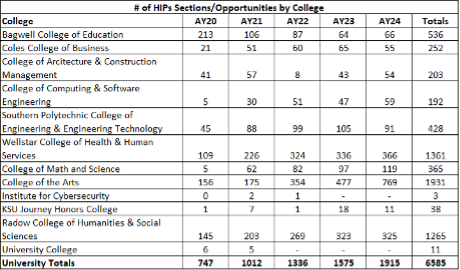Success is more about what you do while you are in college and less about which college you attend. A recent study showed that the most successful students are those who participate in undergraduate experiences, such as internships, undergraduate research, and service-learning. These engaged learning opportunities allow students to take what they learn in the classroom and apply it to the real world. Through internships, undergraduate research, and service-learning, students also gain unparalleled opportunities to hone their critical thinking and communication skills. More importantly, these opportunities pay dividends for students well beyond graduation.
At Kennesaw State, we believe that doing is the key to learning, which is why we are focused on increasing the number of engaged learning opportunities and giving more students the chance to learn by doing. We developed our Quality Enhancement Plan, It's About Engagement, to advance KSU’s mission of student success by focusing on the dynamic nature of engaged learning in each of the academic colleges and the university overall.
Evaluation Plan and measures:
Goal #1: Increase the number of opportunities for students to engage in internships, undergraduate research, and service-learning in undergraduate degree programs in each of the academic colleges and for the university as a whole.
Goal #2: Increase the number of students engaging in internships, undergraduate research, and service-learning opportunities in undergraduate degree programs in each of the academic colleges and for the university as a whole.
SLO #1: Students will cite meaningful and valuable connections of their HIP experiences to their overall educational preparation.
SLO #2: Students will gain new insights on the connectedness and integration of the academic preparation of their disciplines of study to the applied settings of their HIP experiences.
SLO #3: Students will build upon prior knowledge and experiences to respond effectively to the new and challenging demands of their HIP settings.
SLO #4: Students will demonstrate growth in professional and personal core values and sense of self as a result of their HIP experiences.
Current Status:
Goal #1: Increase the number of opportunities for students to engage in internships, undergraduate research, and service-learning in undergraduate degree programs in each of the academic colleges and for the university as a whole.
QEP ends Spring 2024 – The course coding is complete at the time of this report.
Goal #2: Increase the number of students engaging in internships, undergraduate research, and service-learning opportunities in undergraduate degree programs in each of the academic colleges and for the university as a whole.
|
Academic Year |
Service Learning |
Work-Based Learning |
Undergraduate Research |
Total Students |
|
2019-2020 |
1,986 |
4,290 |
3,456 |
9,732 |
|
2020-2021 |
1,849 |
4,021 |
4,242 |
10,112 |
|
2021-2022 |
1,853 |
5,477 |
6,176 |
13,506 |
|
2022-2023 |
2,525 |
5,016 |
8,040 |
15,581 |
|
2023-2024* |
1,251 |
2,145 |
4,616 |
8012 |
QEP ends Spring 2024 – The course coding is complete at the time of this report.
SLO #1: Students will cite meaningful and valuable connections of their HIP experiences to their overall educational preparation.
QEP ends Spring 2024 – Student Reflections are not scored until May of each year so data for Year 5 is not available at the time of this report.
SLO #2: Students will gain new insights on the connectedness and integration of the academic preparation of their disciplines of study to the applied settings of their HIP experiences.
QEP ends Spring 2024 – Student Reflections are not scored until May of each year so data for Year 5 is not available at the time of this report.
SLO #3: Students will build upon prior knowledge and experiences to respond effectively to the new and challenging demands of their HIP settings.
QEP ends Spring 2024 – Student Reflections are not scored until May of each year so data for Year 5 is not available at the time of this report.
SLO #4: Students will demonstrate growth in professional and personal core values and sense of self as a result of their HIP experiences.
QEP ends Spring 2024 – Student Reflections are not scored until May of each year so data for Year 5 is not available at the time of this report.
As the QEP enters the fifth and final year, the focus is to expand the number of participating courses and the number of students engaging in courses utilizing one of the three HIPs. Similarly, refinements have been made that will hopefully increase the quality of the student reflections evaluated in May of each year.
Steps taken in 2023 will continue to focus on the use of the CAD (Course Attribute Dashboard) to accurately code courses using HIPs and to verify the course is utilizing the HIP according to the QEP definition and expectation. As the institution gets better at ensuring all courses coded with a HIP meet the definitions set forth, we will likely see a decrease in the data relating to the number of courses coded and the number of students engaging. However, this reduction shows an improvement in the implementation of the QEP with respect to accurately coding courses that are actually leveraging a HIP within the curriculum of the course. It is also believed that adhering to the course expectations for utilizing a HIP and how it is embedded within a course will lead to higher-quality student reflections.
As stated last year, familiarizing new administrators with the QEP and its processes continues to be the biggest challenge. We continue to have a significant amount of turnover in leadership positions involved with QEP implementation. Likewise, training everyone on the new tools to improve coding and data collection has taken time and resources. However, we have developed increasingly effective resources and training for faculty and administrators, which help orient individuals to the QEP and the implementation expectations.
Through its development of CAD, the system office has already been deeply supportive of our efforts.






